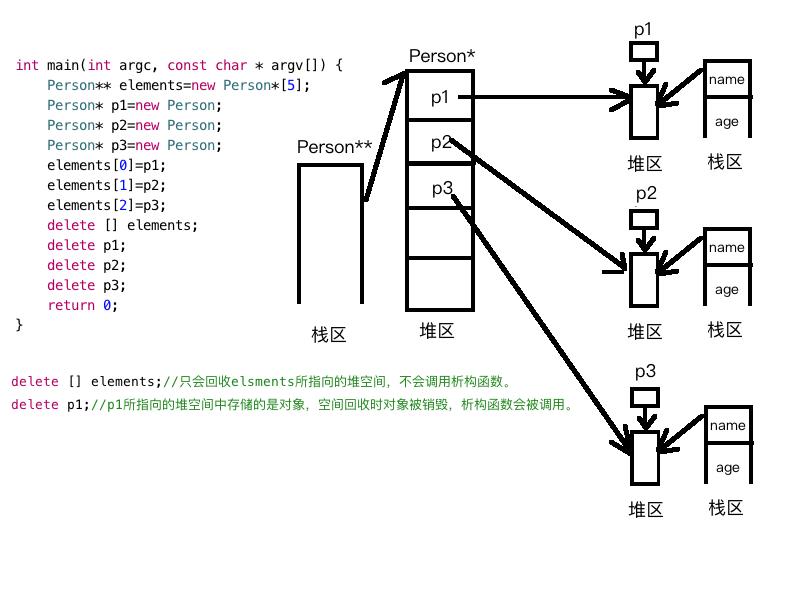C++第七天笔记2016年02月24日(周三)P.M
Posted
tags:
篇首语:本文由小常识网(cha138.com)小编为大家整理,主要介绍了C++第七天笔记2016年02月24日(周三)P.M相关的知识,希望对你有一定的参考价值。
1. 哪些构造函数支持做类型转换?
传递一个参数就可以被调用的构造函数。
2. 不同函数调用时间分析源码:
1 #include <iostream> 2 using namespace std; 3 4 class Demo{ 5 public: 6 Demo(int n=0):i(n){cout<<"默认构造函数被调用"<<endl;} 7 Demo(const Demo& a) 8 { 9 i=a.i; 10 cout<<"拷贝构造函数被调用"<<endl; 11 } 12 ~Demo(){cout<<"构造函数被析构"<<endl;} 13 const Demo& operator=(const Demo& a) 14 { 15 this->i=a.i; 16 cout<<"赋值运算符重载被调用"<<endl; 17 return *this; 18 } 19 Demo& set_value(int n){i=n;return *this;} 20 int get_value(){return i;} 21 private: 22 int i; 23 }; 24 Demo foo(Demo x){//函数被调用时,初始化新对象x会调用拷贝构造函数 25 Demo d;//声明对象d调用默认构造函数 26 return d;//以值的方式返回对象时,编译器会为返回值生成一个中间对象(即使用d拷贝生成新对象)会调用拷贝构造函数。 27 }//函数调用结束时,对象x和d的作用域结束,分别调用析构函数回收d和x的资源。 28 int main(int argc, const char * argv[]) { 29 30 Demo a(2);//声明对象a会调用默认构造函数 31 { 32 Demo b;//声明对象b时默认构造函数被调用 33 b=foo(a); 34 /*调用函数foo(跳转到foo函数处查看函数具体调用情况说明)。一旦函数调用结束,赋值重载函数会被调用(将右值赋值给左值) 赋值结束后,foo(a)表达式的值(即返回的中间对象)使用结束,会调用析构函数回收其资源。*/ 35 }//块域结束,则对象b作用域结束,析构函数会被调用。 36 Demo c=a;//用一个已经存在的对象a创建并初始化新对象c 会调用拷贝构造函数 37 return 0; 38 }//main函数域结束,则对象a c作用域结束,会调用析构函数分别回收c a的资源
3. 构造函数类型转换:
1 #include <iostream> 2 #include "cstring" 3 using namespace std; 4 5 class String 6 { 7 public: 8 String():len(0),rep(new char[1]){ 9 strcpy(rep, ""); 10 } 11 String(char* s) 12 { 13 if (!s) { 14 len=0; 15 rep=new char[1]; 16 strcpy(rep, ""); 17 } 18 else{ 19 len=(int)strlen(s); 20 rep=new char[len+1]; 21 strcpy(rep,s); 22 } 23 } 24 String(const String& str):len(str.len),rep(new char[str.len+1]){ 25 strcpy(rep, str.rep); 26 } 27 ~String(){ 28 delete [] rep; 29 } 30 friend void print(const String& s); 31 private: 32 char* rep; 33 int len; 34 }; 35 void print(const String& s) 36 { 37 cout<<s.rep<<endl; 38 } 39 int main(int argc, const char * argv[]) { 40 char* a="aaaaaaaa"; 41 print(a); 42 print("11111"); 43 String b="bbbbbbbb"; 44 print(b); 45 return 0; 46 }
4. 构造函数与对象数组源码:
1 #include <iostream> 2 #include "cstring" 3 using namespace std; 4 class Item 5 { 6 public: 7 Item():name(new char[1]),id(0){strcpy(name, "");} 8 Item(char* s,int i=0):id(i),name(new char[strlen(s)+1]){ 9 strcpy(name, s); 10 } 11 void set(char* s,int i){ 12 if (name) { 13 delete [] name; 14 name=new char[strlen(s)+1]; 15 strcpy(name, s); 16 id=i; 17 } 18 } 19 ~Item(){delete [] name;} 20 friend ostream& operator<<(ostream& out,const Item& i); 21 private: 22 char* name; 23 int id; 24 }; 25 26 ostream& operator<<(ostream& out,const Item& i) 27 { 28 out<<endl<<i.name<<" "<<i.id; 29 return out; 30 } 31 int main(int argc, const char * argv[]) { 32 Item stat[2]={Item("pen",2334),Item("note",3155)}; 33 Item meat[3]={"fd","dfs","rtfe"}; 34 Item nothing[2]; 35 Item* ptr=new Item[3]; 36 for (int i=0; i<2; ++i) { 37 cout<<stat[i]; 38 } 39 for (int i=0; i<3; ++i) { 40 cout<<meat[i]; 41 } 42 for (int i=0; i<2; ++i) { 43 nothing[i].set("djkjdf", i+1); 44 cout<<nothing[i]; 45 } 46 for (int i=0; i<3; ++i) { 47 ptr[i].set("dags", i+1); 48 cout<<ptr[i]; 49 } 50 delete [] ptr; 51 return 0; 52 }
5. 补充:内存分析(第一次大作业)
#include <iostream> #include"cstring" using namespace std; class Person { public: Person(char* _name="jack",int _age=0):name(new char[strlen(_name)+1]),age(_age){ strcpy(name, _name); } ~Person(){ cout<<"析构"<<endl; delete [] name; } private: char* name; int age; }; int main(int argc, const char * argv[]) { Person** elements=new Person*[5];//对象数组 Person* p1=new Person; Person* p2=new Person; Person* p3=new Person; elements[0]=p1; elements[1]=p2; elements[2]=p3; delete [] elements;//只会回收elsments所指向的堆空间,不会调用析构函数。 delete p1;//p1所指向的堆空间中存储的是对象,空间回收时对象被销毁,析构函数会被调用。 delete p2; delete p3; return 0; }

以上是关于C++第七天笔记2016年02月24日(周三)P.M的主要内容,如果未能解决你的问题,请参考以下文章